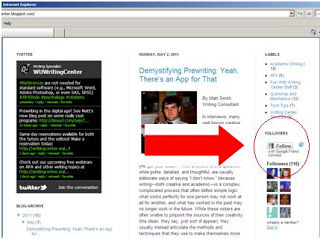Jamie Patterson's Blog, page 41
May 5, 2011
Questions Books Ask
Is it possible, finally, for one human being to achieve perfect
understanding of another?
We can invest enormous time and energy in serious efforts to know another
person, but in the end, how close are we able to come to the person's essence?
We convince ourselves that we know the other person well, but do we really know
anything important about anyone?
Haruki Murakami
How to Revise
Want the secret ticket to writing well? Here's how: revise.
Here's how to revise:
1.Allow enough time for several iterations. Make a writing plan.
2. Break apart the revising the proofreading. This means worry about things like comma use apart from worrying about your content and what it is you're trying to say. Start off with either approach by asking yourself: what is it I'm trying to say and am I successful in saying it? And have I presented the information in such a way (punctuations, spelling, formatting) that makes it accessible?
3. Keep an eye out for repetition and revise for improved word choice if you find a word that keeps popping up.
4. Read the last line of a paragraph and the first line of the next paragraph. Ask yourself: does the information flow from one paragraph to the next?
5. Read your document out loud.
6. Have a really nice friend or family member (or even a mean friend or family member; they need only to be willing) read through and ask questions. It's super helpful if you ask that they just ask you questions and not necessarily mark your paper. This way, you get a reader's response that will really help your revision approach by forcing you to think critically about your existing text.
7. Set a number of iterations. Tell yourself that the seventh draft will be your final draft and keep revising until you hit number 7. (But keep in mind that some documents will require much more, some much less. Just get in the practice of rejecting the notion of first draft as final draft.)
With time, the idea of revision should be super liberating. It means that not every word needs to be perfect as thoughts go from your mind to paper.
Let's part with this last bit: the number one way to revise is to get the first draft out of the way. In other words: write! Write!
Denver Library/Book Stores in Japan
Check out the Denver Library's book blog for some terrific posts. The latest post highlights Japanese authors, which is terrific because I'm just now reading Haruki Murakami's The Wind-Up Bird Chronicle. I'm a fan of What I Talk About When I Talk About Running but this is my first experience with Murakami's fiction. So far, it definitely lives up to its reputation of surprising (shocking?) and captivating.
To all siblings of mine who may or may not be riding bullet trains today: head to Shinjuku or Shibuya when you're back in Tokyo and find the Kinokuniya Book Store. I bet they'll have Murakami's stuff in English!

Denver Library
May 4, 2011
Its vs. it's
The battle here is between its (no apostrophe) and it's (apostrophe s) so let me break it down for you:
It's is the contraction of it and is. The apostrophe takes the place of the "i" in is.
Example: It's raining men. (It is raining men.) Hallelujah!Its is a possessive
Example: The party had a life of its own.And it's just that simple.
May 3, 2011
Follow a Blog with Google Reader
With the creation of this blog I realized how many people leave following blogs out of their daily news intake so I thought I'd better walk people through how, exactly, to follow this blog and others. In the right margin of most blogs you'll find something that says "follow." If it's not in the right margin, then just look around, you'll find it. If you click on follow you'll get the chance to choose which source to follow from. If you use yahoo, then yahoo, if gmail, then gmail and so on.
We'll talk specifically how to follow using google reader. When you follow a blog with google reader, then you're placing the new posts from that blog into your own personal reader that updates with each new post from each of the blogs you follow. This means, no, you do not get an email every time a blog updates (although you can arrange for this, too). You simply get the latest from that blog in your own personal news feed from the collection of blogs you'd like to follow and its accessible to you when you sign into your google account and click on reader.
It's pretty darn nifty, if you ask me.
Step by step directions below for following a blog via google reader. And, hey, try it out on this blog, whydontcha?
1. Find a blog you want to follow and find the follow button.

2. Select how you'd like to follow.

3. Sign in to your already-existing email!

4. Select how you'd like to follow: publicly (so everyone will just see your name) or privately (no one will see your name.

5. Enjoy your new source of news any time you wish by signing into gmail and clicking on the reader button.

Why Harry Potter is Worth Reading
A met a friend for coffee and when he saw what I was reading his reaction was, I think I can quote verbatim, "why read Harry Potter when there are so many better things to read?" Now, I'm well acquainted with literary snobs. I'm surrounded by them, related to them, am a recovering snob myself. I won't name names, but I know people who will refuse a book simply because it was on Oprah's book club or chosen as a Starbucks book. So I wasn't really shamed by my friend's comment, but it did make me curious.
Considering that reading itself is so private (so what does it matter who else read the book and when?) I wonder what it is about my coffee shop friend, and about my anti-Oprah Book Club book friends, or myself for waiting until all the hoopla around Harry Potter (mostly) died down before reading, that makes it so easy to pass judgment on a book based on popularity?
Which, as a writing teacher, brings me to an even more pressing question: what makes a good story a good story? Certainly not audience size. The Twilight Series made readers out of thousands and yet Pulitzer Prize winner Tinkers had only sold about 7,000 copies at the time of the award. Yep, I'm passing judgment on Twilight but I can, see, because I read the entire series. The writing and editing was kind of painful but the story was good. So what does that say for the craft of writing?
The thing with Harry Potter is that it has the popular appeal in topic and in story that Twilight has but each book in the Harry Potter series is also incredibly well crafted. Harry Potter might just be the intersection of mass appeal and really good writing that happens so rarely and takes most authors years of writing and publishing to accomplish. Note: Eat, Pray, Love was Elizabeth Gilbert's fourth book. The Road was Cormac McCarthy's tenth.
So we won't get answers to these questions that will satisfy, well, probably anyone, but we can at least read. Read, have our own experiences with the text, and maybe (if we choose) share that experience with others. I think one of the reasons I recommend books or ask for recommendations is so that I can have that shared experience. I want absolutely everyone to read Wide Sargasso Sea but at the right time in their lives, on their terms, so that they might have the same moving experience that I did with the text. And I think that's what makes Harry Potter worth reading, albeit if it's done on your own time on your own terms, whether you're 10 or 62. There's a real chance to be moved by the Harry Potter story in some way, large or small, and maybe that's why we all read? To escape, to be moved, to be changed by something as simple and as powerful as words on paper.
Regard vs. Regards
All the style guides agree that you absolutely should not use an s. So you'll have: in regard to (not in regards to).
The only time it might be appropriate to add that pesky s on the end would be when you're giving your regards. For instance: give my regards to your family.
So, to recap:
Correct:
His comment on improving my manners was in regard to our last date.
Correct:
Please give my regards to the Duke and Duchess of Cambridge.
And now you know which wins when in the battle between regard and regards.
May 2, 2011
Grammar Nitpickery: Toward vs. Towards
Yep. Sure thing.
Toward is the American English spelling and Towards is the British English spelling.
And now you know.
Really Good Read: Slouching Towards Bethlehem
I'm not sure how I made it through two English degrees and countless creative writing courses without being introduced to Joan Didion. It wasn't until I was long out of school and entered the writing community that I first read Joan Didion's Slouching Towards Bethlehem. I was captivated. I mostly read it commuting on the city bus and it had the power to block out all other sounds and surroundings.
Listen to an interview with Didion here, or read a terrific article and interview in the Paris Review here.




